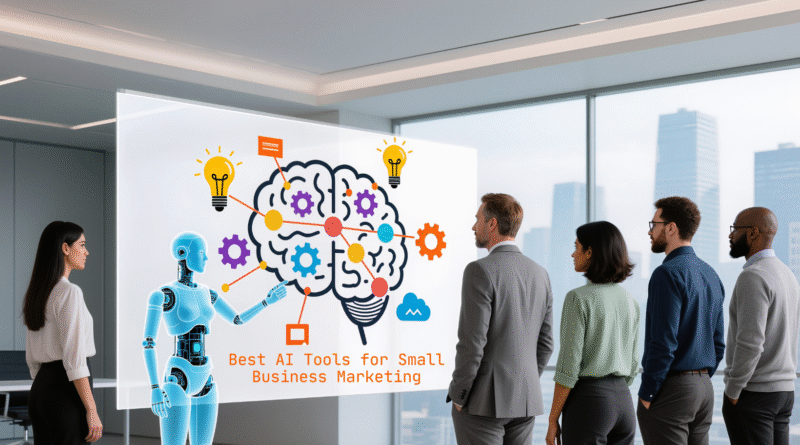Best AI Tools for Small Business Marketing in 2026 — Boost Efficiency, Engagement & Growth
Small business owners often juggle limited time, tight budgets, and high expectations. In this context, Artificial Intelligence (AI) becomes a game-changer: it empowers automation, boosts decision-making, and helps you compete smarter—without hiring big teams or breaking the bank.
In this article, we’ll explore carefully selected AI tools tailored for small businesses, outline their key benefits, address common challenges, and guide you through implementation — so you can start leveraging AI effectively today.
✅ Why AI Tools Are Critical for Small Business Marketing
| Marketing Challenge | How AI Helps |
|---|---|
| Limited manpower & repetitive tasks | Automates content creation, data handling, customer responses, lead follow-ups — freeing up valuable time. |
| Lack of deep marketing expertise | Provides actionable insights (lead scoring, content optimization, analytics) even for non-experts. |
| Need for personalization to stand out | AI-generated interactive funnels, segmentation & personalization boosts conversions & customer satisfaction. |
| Budget constraints | Many tools offer free/affordable tiers, ensuring ROI even for small teams. |
Real-world examples:
- A local boutique increased website traffic by 70% and cut content creation time by 75% using AI content tools. Growthegy – Growth Strategy
- Another business applied AI-powered recommendation engines for personalization, boosting sales by 25% within six months. wjarr.co.in
In short: AI helps small businesses not only survive but thrive — by enhancing productivity, reducing overheads, and improving marketing precision.
🛠️ Top AI Tools for Small Business Marketing
Here’s a curated list of AI tools with clear features, use-cases, and what problems they solve. Choose according to your priorities (content, SEO, automation, analytics, etc.).
1. HubSpot Marketing Hub — All-in-One Marketing Automation
Strengths & Use-Cases
- Offers AI-assisted content creation, predictive lead scoring, email campaign optimization, and CRM integration.
- Seamless workflows across marketing, sales, and support — useful when multi-tasking.
- Free tier available — allows small businesses to test AI features before scaling.
Best For: Startups or small businesses seeking a unified solution for nurturing leads and automating repetitive tasks.
Precautions: Advanced features have learning curves; start simple.
2. involve.me — Interactive Funnels & Lead Qualification
Strengths & Use-Cases
- Lets you create conversational/interactive funnels: quizzes, calculators, conditional forms for lead qualification & conversion.
- AI-generated personalized feedback and segmentation logic; works with CRM integrations.
Best For: Businesses that rely on lead magnets, need custom data collection or want enhanced visitor engagement without building from scratch.
Precautions: Choose plan carefully to match volume/usage needs.
3. Fireflies.ai — Conversation Intelligence & Call Analysis
Strengths & Use-Cases
- Transcribes meetings/calls automatically, extracts themes, action items, and insights — ideal for refining pitch, understanding customers.
- Integrates with CRM tools to maintain record consistency & reduce manual entry.
Best For: Service-based businesses or solo entrepreneurs where customer interaction insights matter.
Precautions: Always double-check transcripts for accuracy, especially with accents/noisy recordings.
4. Jasper AI — AI Content Generation
Strengths & Use-Cases
- Supports creation of blog posts, ad copies, social media content, emails with templates and brand voice customization.
- Speeds up writing workflows drastically — particularly useful when scaling content output.
Best For: Small marketing teams or solo owners needing high-quality content on demand.
Precautions: AI output needs human review to maintain brand authenticity and avoid overgeneralization.
5. Copy.ai — Quick Ad & Social Copy Generator
Strengths & Use-Cases
- Excellent for short-form content: ad hooks, social posts, email subject lines with multi-language support.
- Low-cost, easy to use — great for testing several content variations fast.
Best For: Micro-businesses experimenting with digital ads and social campaigns.
Precautions: May require iterations for tone and differentiation — treat outputs as drafts.
6. Canva (with AI-enhanced features) — Visual & Branding Content
Strengths & Use-Cases
- Offers AI-powered design assistance: image generation, layout suggestions, brand templates for non-designers.
- Helps create consistent branded visuals quickly — saving outsourcing costs and time.
Best For: Small teams or solo owners needing good-quality visuals without hiring a designer.
Precautions: Keep a cohesive brand guide to avoid inconsistent design while using templates.
🎯 How to Choose & Implement AI Tools — 5-Step Plan
- Audit your current marketing flow
List repetitive tasks, weak spots (e.g. content, lead capture, customer follow-up), and tools already in use. - Prioritize use-cases vs resources
Choose 1–2 pain points to start with (e.g. content writing, lead qualification). Don’t overcommit all tools at once. - Pilot test with free/low-tier plans
Most tools offer entry plans — evaluate ease of integration, team comfort, and ROI in first 1–2 months. - Store & review data/results
Track metrics: lead conversion rate, content engagement, time saved, customer feedback to gauge effectiveness. - Refine continuously with human oversight
Use AI-generated output as draft — human edit ensures brand voice, accuracy, and relevance.
🔒 Risks & How to Mitigate
| Risk / Concern | Mitigation Strategy |
|---|---|
| Data privacy & compliance | Ensure consent and transparency when collecting data; check tool’s compliance protocols (especially if user data is involved). |
| Over-reliance on AI | Combine AI use with human judgment — review outputs, set brand guidelines, and hold oversight processes. |
| Cost vs ROI mismatch | Begin with free or entry tiers; track time savings or engagement uplift to justify upgrades. |
| Learning curve / misuse | Start small, train your team, and focus on few tools before scaling usage. |
💡 FAQs
No — many tools are user-friendly, aimed at non-tech users and come with intuitive integrations.
Several offer free/entry-level plans; paid tiers depend on scale and features. Always evaluate ROI based on your current needs before upgrading.
AI helps improve efficiency and output, but success still depends on strategy, consistency, and human oversight. Treat AI as an enabler, not a magic bullet.
Yes — many tools are global and compliant; but always verify data handling, consent, and customer privacy as per local laws.
✅ Conclusion
AI is no longer reserved for large enterprises — it’s accessible, scalable, and highly beneficial for small businesses. Whether you need content generation, customer insights, automated funnels, or smarter branding, there’s a tool tailored for you.
Begin with one area, measure results, refine, and scale gradually. With the right AI tools and the right approach, you’re not just saving time — you’re unlocking growth potential.




